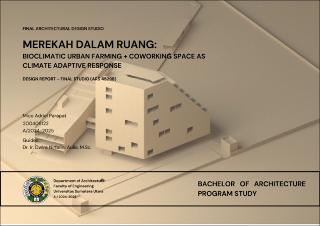| dc.description.abstract | The availability of food needs has become a new challenge from urbanization activities in Medan City. Until now, the community's food needs are still obtained from import-export activities due to insufficient food production produced by local communities. The city's dependence on other regions makes the community vulnerable to food crises that can occur at any time. On the other hand, urbanization has also resulted in damage to the quality of life of urban communities; lack of green land, industrial activities and unhealthy lifestyles. People are prone to anxiety, stress, depression, fatigue, weakness and other conditions that cause a decrease in the productivity of people's lives. Increased food demand and poor quality of life can provide a negative bounce effect from the current adverse impacts.
In this thesis, architecture comes as a reformer of the current form of urbanization. In a further context, architecture will be brought as a form of provocation to generate positivism in the area by uniting green open spaces and commercial public spaces. The architectural design is realized in a blend of coworking space functions with urban agriculture. The bioclimatic architectural approach is chosen to respond to the climate for humans as well as the environment inside the building and become an important part of the catalyst of urban life towards a better life. | en_US |


